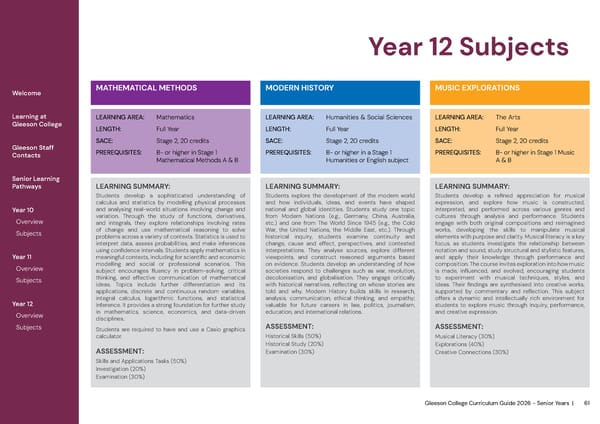Gleeson College Curriculum Guide 2026 - Senior Years | 61 Year 12 Subjects Welcome Learning at Gleeson College Gleeson Staff Contacts Senior Learning Pathways Year 10 Overview Subjects Year 11 Overview Subjects Year 12 Overview Subjects LEARNING SUMMARY: Students develop a sophisticated understanding of calculus and statistics by modelling physical processes and analysing real-world situations involving change and variation. Through the study of functions, derivatives, and integrals, they explore relationships involving rates of change and use mathematical reasoning to solve problems across a variety of contexts. Statistics is used to interpret data, assess probabilities, and make inferences using confidence intervals. Students apply mathematics in meaningful contexts, including for scientific and economic modelling and social or professional scenarios. This subject encourages fluency in problem-solving, critical thinking, and effective communication of mathematical ideas. Topics include further differentiation and its applications, discrete and continuous random variables, integral calculus, logarithmic functions, and statistical inference. It provides a strong foundation for further study in mathematics, science, economics, and data-driven disciplines. Students are required to have and use a Casio graphics calculator. ASSESSMENT: Skills and Applications Tasks (50%) Investigation (20%) Examination (30%) MATHEMATICAL METHODS LEARNING AREA: Mathematics LENGTH: Full Year SACE: Stage 2, 20 credits PREREQUISITES: B- or higher in Stage 1 Mathematical Methods A & B MODERN HISTORY LEARNING AREA: Humanities & Social Sciences LENGTH: Full Year SACE: Stage 2, 20 credits PREREQUISITES: B- or higher in a Stage 1 Humanities or English subject LEARNING SUMMARY: Students explore the development of the modern world and how individuals, ideas, and events have shaped national and global identities. Students study one topic from Modern Nations (e.g., Germany, China, Australia, etc.) and one from The World Since 1945 (e.g., the Cold War, the United Nations, the Middle East, etc.). Through historical inquiry, students examine continuity and change, cause and effect, perspectives, and contested interpretations. They analyse sources, explore different viewpoints, and construct reasoned arguments based on evidence. Students develop an understanding of how societies respond to challenges such as war, revolution, decolonisation, and globalisation. They engage critically with historical narratives, reflecting on whose stories are told and why. Modern History builds skills in research, analysis, communication, ethical thinking, and empathy; valuable for future careers in law, politics, journalism, education, and international relations. ASSESSMENT: Historical Skills (50%) Historical Study (20%) Examination (30%) MUSIC EXPLORATIONS LEARNING AREA: The Arts LENGTH: Full Year SACE: Stage 2, 20 credits PREREQUISITES: B- or higher in Stage 1 Music A & B LEARNING SUMMARY: Students develop a refined appreciation for musical expression, and explore how music is constructed, interpreted, and performed across various genres and cultures through analysis and performance. Students engage with both original compositions and reimagined works, developing the skills to manipulate musical elements with purpose and clarity. Musical literacy is a key focus, as students investigate the relationship between notation and sound, study structural and stylistic features, and apply their knowledge through performance and composition. The course invites exploration into how music is made, influenced, and evolved, encouraging students to experiment with musical techniques, styles, and ideas. Their findings are synthesised into creative works, supported by commentary and reflection. This subject offers a dynamic and intellectually rich environment for students to explore music through inquiry, performance, and creative expression. ASSESSMENT: Musical Literacy (30%) Explorations (40%) Creative Connections (30%)
 2026 Gleeson College Senior Years Curriculum Guide 2026 Page 60 Page 62
2026 Gleeson College Senior Years Curriculum Guide 2026 Page 60 Page 62